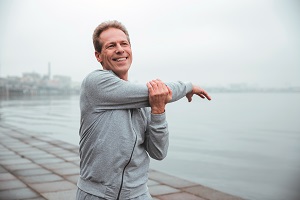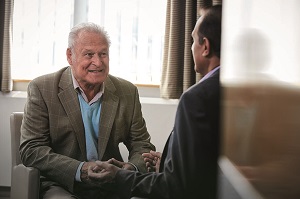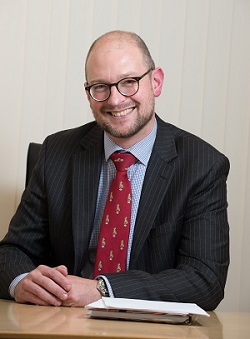Consultant article: Men’s Health - the 8 principles you need to know.
Consultant Urologist Mr Oliver Kayes provides advice around healthier living and the options available for men with bothersome or worsening symptoms...
"Just down the road from us is historic Harrogate, a place that has a long and distinguished history with health and wellbeing. For many years, patrons visited the spa to "take the waters" for their purported health benefits. Nowadays, whilst the benefits around the local mineral waters has waned, the importance for maintaining good health has taken on ever-increasing importance.
For men particularly, a global obesity epidemic in conjunction with increasing concerns around poorer Western diets, lack of exercise alongside higher rates of diabetes, cardiovascular disease, dementia and cancer have focussed the spotlight on men’s health issues. What proactive measures can men take to reverse or delay significant health issues? Can men stay active and healthier into older age?
1. Don’t become a negative statistic!
The good news is that men and women are living longer than ever. However, the largest causes of death by far are cardiovascular disease and cancer; however, mortality ratios for men versus women are increased to a greater extent for some cancers, road traffic accidents and suicide. Men in affluent areas are generally healthier and live longer than those in deprived areas, but some men are at risk or have developed health problems due to overwork, being overweight and alcohol consumption.
2. Start early to provide a good foundation for future health.

The basis for good health starts in childhood and early adult life. Avoidance of a sedentary lifestyle, high calorific foods and risk-taking behaviour are important factors to focus on for men aged 16-40 years. Family planning and sex safe practices are important considerations. Limit time spent watching TV or playing video games, keep alcohol intake to safe levels and avoid/stop smoking or taking recreational drugs. Perform 30-60 minutes of light/moderate intensity exercise everyday. Join a club or social group.
3. It is never to late to tackle bad health habits.
Exercise and diet will have a positive impact on all areas of men’s health at any age. Lower salt intake, Mediterranean style diets with plenty of fresh fruit and vegetables and plenty of exercise help to lower blood pressure, reduce fat deposition and build muscle. Often this can negate the need for regular medication in the longer term and boost natural energy levels with improved quality of life. Remember to get a good night’s sleep which is restorative and linked to better overall outcomes. Keep your waistline measurement below 36 inches, get 6- 8 hours sleep every night and report any severe snoring or if you stop breathing at night (sleep apnoea). Stop smoking.
4. When should I get a check-up?
NEVER ignore significant or bothersome symptoms and seek immediate medical help if you have suffered any blood in the pee/poo or have a strong family history for prostate or bowel problems. Men will benefit from a health MoT from the age of 40 years. This check will focus on cardiovascular and respiratory well-being; as well as prostate health. National screening programmes are in place for some cancers depending on your age.
5. Keeping an active and satisfying sex life.
The good news is that sex is good for you! Regular sexual activity has been shown to lower the risk of prostate problems, maintaining erection quality and keeping men (and their partners) healthier and happier for longer. However, if performance in the bedroom is dipping, it could be a warning sign of more general ill-health or simple ageing. There are a lot of options to improve erectile function which I discuss with patients regularly in my clinics including pills, injections, shockwave therapy and penile implants.
6. Could my testosterone level be low?
Men with low testosterone may report a number of specific symptoms, namely: lack of energy, low libido, difficulty losing weight, low mood, difficulty focusing on tasks, erectile dysfunction and infertility. Testosterone is the important hormone produced in the testes (and adrenal) in men which is important for red blood cell and bone production, cognitive functioning and sexual effects. Symptom questionnaires and a measurement of blood hormone levels help to guide treatment or replacement for some men with testosterone gels or injections.
7. Beating prostate problems.

40-50% of men aged 50 years have evidence of an enlarged prostate; increasing to 80% of men aged over 80 years. Therefore, it is not unusual for men to start to develop waterworks symptoms such as low flow, getting up at night, bladder infections or even blood in the semen/pee from a younger age. Understanding whether this an inflammatory (prostatitis), benign enlargement (BPH) or malignant (prostate cancer) is essential in order to pick the most appropriate tests and treatments. Stay well hydrated and regular ejaculation are helpful. Assessment usually involves a prostate exam, urine sample and PSA test in the first instance.
8. Active body and mind.
Use it or lose it!! By taking early proactive steps to maintain good health can lead to better cognitive and musculoskeletal function in later life whilst reducing the risks for major cardiovascular or cancer problems. Newer minimally invasive treatments for prostate enlargement (e.g. 'Urolift' or 'Rezum'), testosterone replacement and erectile dysfunction therapy can reduce symptoms whilst restoring function and quality of life for all men with faster recovery and fewer side effects observed."
If you like to make an appointment with Mr Oliver Kayes, contact our outpatient team on: 0113 388 2067.
About Mr Oliver Kayes

Mr Oliver Kayes is as a consultant urologist and honorary senior lecturer at Leeds Teaching Hospitals. Additionally, he works alongside infertility colleagues at the Leeds Centre for Reproductive Medicine (LCRM).
His special interests include benign prostate conditions, male sexual dysfunction, male infertility, urological cancers and genital reconstructive surgery. He completed his specialist surgical training in Cambridge and London; including a two-year fellowship working with international experts at University College London Hospital.
